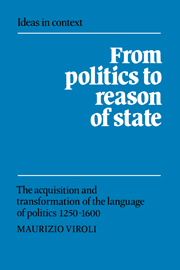 From Politics to Reason of State
From Politics to Reason of State Published online by Cambridge University Press: 02 February 2010
In the story of the transition from politics to reason of state the central place belongs to Niccolo Machiavelli. Over the centuries, Machiavelli has been regarded as being mainly responsible for the dismissal of the notion of politics as the art of the republic, and the spiritual father of the doctrine of reason of state.
Be it his sin or his greatest contribution to modern culture, what seems to be above dispute is that Machiavelli rejected the republican language and provided us with a new account of the goals and the means of politics. Against the view that politics is the art of establishing and preserving a good community, Machiavelli, it has been argued, stressed that the goal of politics is the pursuit of power, and that the “political man” cannot be the “good man of the ancients.” While some scholars have stressed that the originality of Machiavelli consists in the redefinition of the aim of politics, others have emphasised his contribution to a new methodology of political enquiry, or have presented Machiavelli as the theorist of politics as innovation, whose symbol is no longer the Humanists' good man, but the new prince. In his writings, politics assumes a more general significance meaning the art of dealing with contingent events, with fickle fortune, the symbol of pure, uncontrolled and unlegitimated contingency. Others still, in more recent years, have emphasized Machiavelli as the theorist of a republican version of power politics, whose main goal is not liberty, but greatness, expansion and glory.
To save this book to your Kindle, first ensure [email protected] is added to your Approved Personal Document E-mail List under your Personal Document Settings on the Manage Your Content and Devices page of your Amazon account. Then enter the ‘name’ part of your Kindle email address below. Find out more about saving to your Kindle.
Note you can select to save to either the @free.kindle.com or @kindle.com variations. ‘@free.kindle.com’ emails are free but can only be saved to your device when it is connected to wi-fi. ‘@kindle.com’ emails can be delivered even when you are not connected to wi-fi, but note that service fees apply.
Find out more about the Kindle Personal Document Service.
To save content items to your account, please confirm that you agree to abide by our usage policies. If this is the first time you use this feature, you will be asked to authorise Cambridge Core to connect with your account. Find out more about saving content to Dropbox.
To save content items to your account, please confirm that you agree to abide by our usage policies. If this is the first time you use this feature, you will be asked to authorise Cambridge Core to connect with your account. Find out more about saving content to Google Drive.